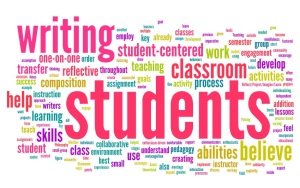
School is back in session. Wooo! We technically started a week ago Monday, but the “Arctic Vortex” or whatever they’re calling it these days really threw getting back into class into a frenzy. We had a missed day of school, and I had to cancel my own classes another day because there was no way I was getting out of my driveway and to school safely.
I’m glad school is back in session, though, because I’m really enjoying teaching my 105 classes this semester. I love research and was so looking forward to it, but I was disappointed in my fall sections. This spring seems to be going much better. 🙂
I’m going to get a little dorky in today’s Friday Favorites, and talk about some of my preferred readers, especially for first-year composition.
5. Understanding Rhetoric: A Graphic Guide to Writing by Elizabeth Losh, Jonathan Alexander, Kevin Cannon, and Zander Cannon
I think this book is super cool, and if I were teaching a class that is more focused on rhetoric, I would definitely use it. I used a couple of chapters in a junior-level course on writing in the professions, and I think it would pretty well. It’s a little bit corny, but I kind of like that in a text.
4. Everything’s an Argument by Angela Lunsford, John J. Ruszkiewicz, and Keith Walters
I have taught with the fifth edition a couple of times, and I think this book is very handy for describing rhetorical ideas. Some students found the readings a little boring, but overall they tended to do well when we discussed them. I like that this reader includes some essays as examples, as well.
3. They Say/I Say: The Moves that Matter in Academic Writing by Gerald Graff, Cathy Birkenstein, and Russell Durst
Even though I bought this book in my first semester of graduate school, this is my first time teaching with it. So far, I think it’s been very successful. The version with readings makes assigning reading to practice the strategies presented much easier, even if the articles are somewhat dated in the second edition. I haven’t heard anything about a new one (yet) but I would definitely get it if it was available. Some people argue that this book can be simplifying, but I think it will be good for helping students with quote integration and balancing research and their own ideas. This book is also cool because it could be used in non-comp classes, too.
2. Writing about Writing: A Reader by Elizabeth Wardle and Douglas Downs
If I could teach a class that followed the plans and essays presented in this reader, it would be perfect. I’m so into the Writing-about-Writing approach, it’s not even funny. Wardle and Downs are two very influential scholars for me, so it’s not surprising that this text ranks highly. But, it can be a little challenging to adapt to some curricula. I do like that most of the readings are reprints, so if you don’t want to splurge for the book, you can find them elsewhere. This means you don’t get the helpful contextual statements at the beginning, though. I know a second edition is in the works to focus on threshold concepts. This should be a fascinating read, as well!
1. How to Write Anything by John J. Ruszkiewicz.
I used this book last fall, and I probably should still be using it. It breaks down how to approach and write assignments based on their genres. But the really handy thing that I LOVE about this book is the interactive references. For example, it will explain where students can look for related ideas. If it’s talking about the letter-writing genre, it might say “if you need help developing your audience, go to this page.” It makes it a great tool for students, and it is less of a linear read than most handbooks. I may pick it back up in the future for students because I do like it *that much.* I also like that this book could be used in non-comp classes. Any teacher that wants to teach writing (especially a writing-in-the-major course) could benefit from this text!
Do you have a favorite tool for learning (or teaching) writing?











Recent Comments